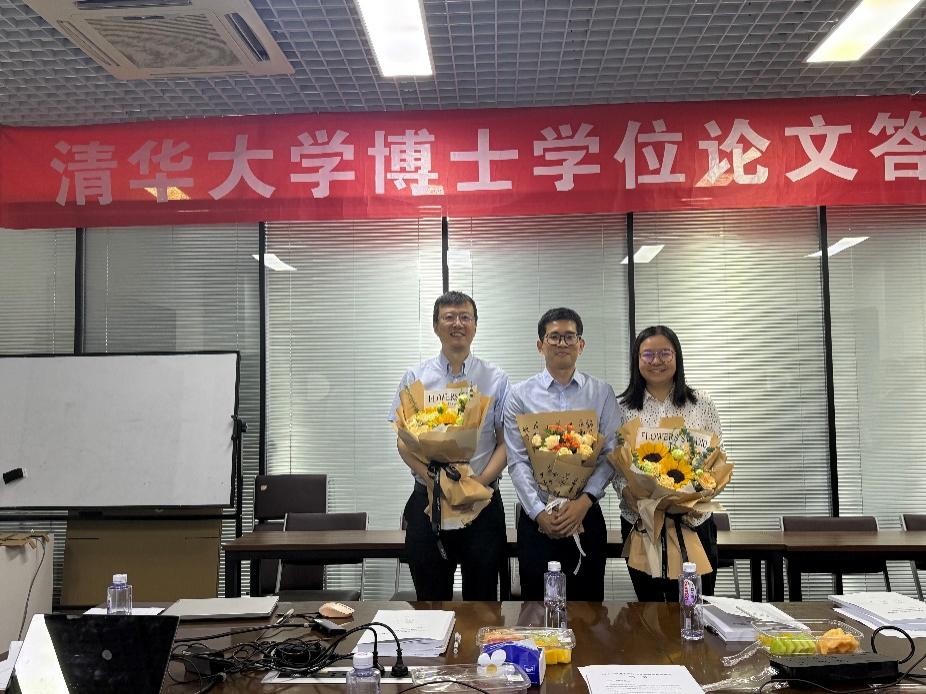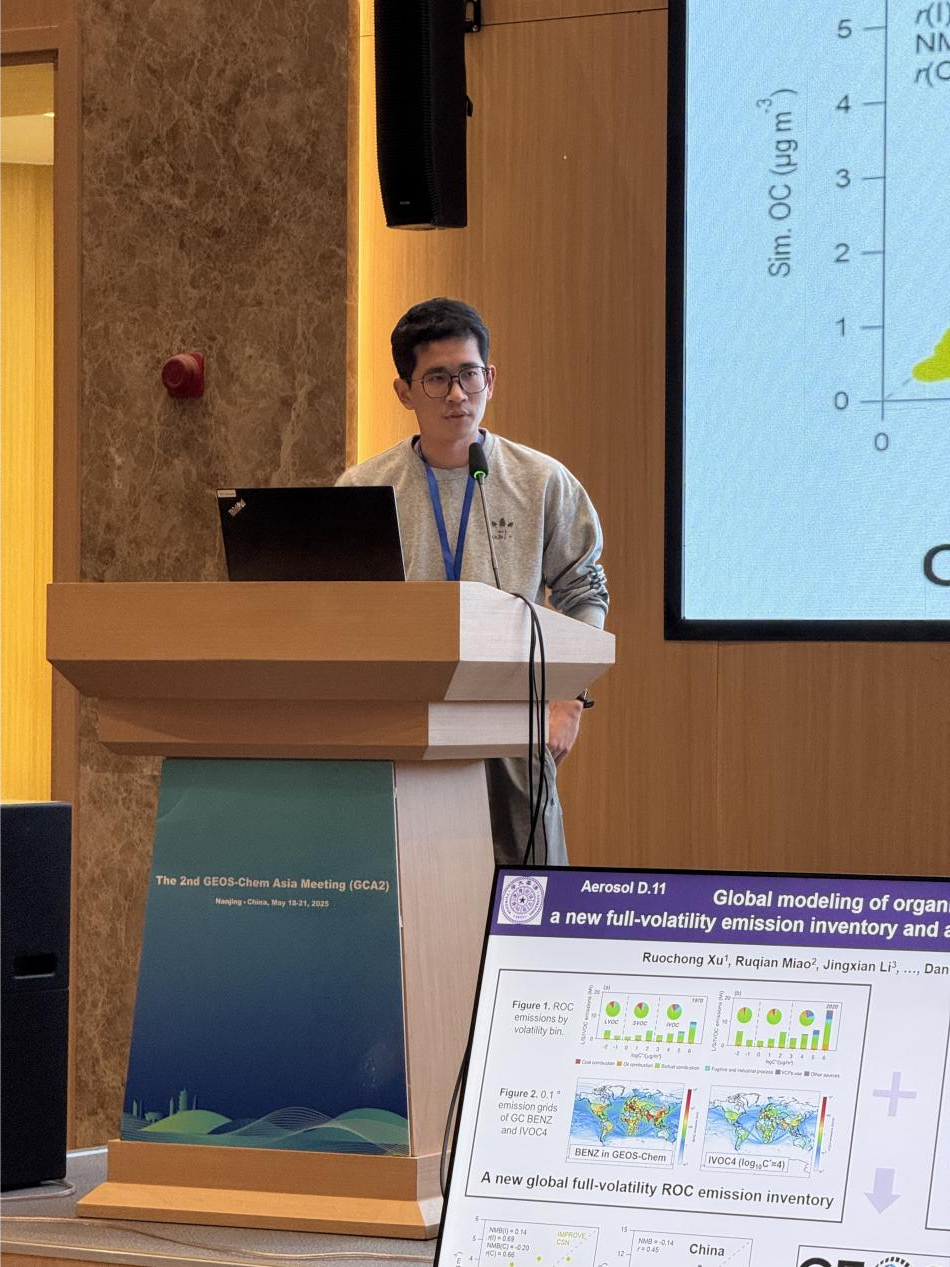Xu Ruochong, Class 2025 doctoral graduate in Atmospheric Science from Tsinghua University's Department of Earth System Science (DESS), conducted research under Professor Zhang Qiang specializing in greenhouse gas/air pollutant emission inventories and atmospheric organic chemistry modeling. He has published, as first author, three papers and received honors including Tsinghua Outstanding Doctoral Graduate, Tsinghua Outstanding Doctoral Dissertation Award, Deng Jiaxian Scholarship, National Doctoral Scholarship, and selection for China Association for Science and Technology's Young Talent Support Program.
Grounded in Data: Down-to-Earth Research
Xu Ruochong’s doctoral research started with facility-scale carbon emission inventories—a data-intensive foundation bridging emission accounting and climate governance. At the beginning, he found the protracted demands of data collection and curation somewhat tedious, and became hesitant about the research. Professor Zhang Qiang provided a crucial perspective, “While emission quantification and mitigation strategies for energy-intensive sectors like global power, steel, and cement remain constrained to macro-scale analysis due to data scarcity, our granular research addresses the urgent need for precision in low-carbon transitions.” He emphasized, “Though demanding, this down-to-earth foundational work carries profound significance.”
Under the guidance of Professor Zhang Qiang, Xu Ruochong dedicated himself to overcoming the bottleneck of facility-scale emission quantification. Over nearly two years, he developed big data mining and emission characterization methods for high-energy-consuming facilities, constructing a global facility-scale emission database covering all steel plants. This database enabled the first revelation of a single-plant-targeted decarbonization strategy for the global steel industry.
Furthermore, he collaborated with team members to establish the Global Infrastructure emissions Detector (GID), providing the scientific community with accurate, public, and regularly updated facility emission data. Countless “dull” nights spent organizing data made him acutely aware of the significance and value of fundamental data work—invaluable groundwork along his research path that has fueled his growth.
Xu Ruochong always remembers how Professor Zhang Qiang constantly stresses to students, “Research must serve the nation's needs.” During this research, he gradually realized that the global atmospheric emission research field is dominated by European and American institutions, but the products developed by them contain significant biases in estimating greenhouse gas and pollutant emissions from developing countries—particularly China. This hinders China's efforts to assert its legitimate rights in international climate governance. Motivated to address this problem, Xu translated his vision into action by constructing a global anthropogenic carbon emission database with high-precision information, providing robust basic data support for China to enhance its voice and initiative in climate governance.
At academic conferences such as the COP27 Global Climate Conference side events, the European Geosciences Union (EGU) General Assembly, and the Global Emissions Inventory Activity (GEIA) Annual Meeting, Xu Ruochong and Professor Zhang Qiang presented this research, receiving positive feedback from numerous domestic and international researchers.

Xu Ruochong with advisor Professor Zhang Qiang (left) and Associate Professor Tong Dan (right) after dissertation defense.
Unbounded Learning: Transcending Comfort Zones
Xu Ruochong has never confined his research to basic data work alone. Through his scientific journey, he gradually developed his own research perspectives and found his academic passions. He believes that continuous expansion of research frontiers is the only way to enhance research excellence.
With the support of Professor Zhang Qiang, Xu built upon his emission inventory research and began integrating emissions, policies, and atmospheric chemistry—using atmospheric chemical processes as a bridge to conduct full-chain research spanning “emission inventory-chemical modeling-policy governance.” This, however, meant stepping out of his research comfort zone to explore atmospheric organic chemistry modeling, a direction seldom ventured by others in the team.
In hindsight, Xu Ruochong deems this decision profoundly right. He initiated collaborations with research teams from Peking University, the University of Washington (U.S.), and Switzerland's PSI Institute, continuously absorbing new knowledge. Through this, he discovered the fascination in understanding and exploring the complex species, reactions, and feedback processes in the atmosphere.
To deepen his expertise, Xu conducted a six-month research exchange at the University of Washington’s Department of Atmospheric Sciences through Tsinghua’s Short-Term Visiting Scholar Program, joining Professor Joel Thornton’s team. There, he pioneered global simulations of highly oxygenated organic molecules (HOMs), becoming the first to integrate monoterpene-driven HOM formation processes into the GEOS-Chem chemical transport model—yielding observation-validated results that garnered significant field recognition.
This international exposure crystallized his understanding of diverse scientific perspectives, refining his approach to connecting micro-scale phenomena with macro-scale scientific challenges. Currently advancing global organic aerosol modeling research, he addresses the critical limitation of region-specific simulation frameworks while persistently expanding his scholarly frontiers.
During his visiting scholarship, he gained profound insights into diverse research perspectives and values, fostering deeper reflections on how to link local, micro-scale problem-solving research with global macro-scientific issues. Currently, he is conducting global organic aerosol modeling research, aiming to address the challenge that existing inventories and modeling frameworks struggle to apply uniformly across global regions, while continuously expanding the frontiers of his scientific inquiry.

Xu presents a poster at GEOS-Chem Asia Conference
Xu's Tsinghua experience crystallized a fundamental truth: scientific pursuit guarantees neither solutions nor recognition. Yet the act itself—probing meaningful questions, embracing daily incremental progress, maintaining scholarly integrity—constitutes its own reward.
“Every ascent begins from below; each journey starts where you stand,” he observes. “The struggle, joy, frustration, and discovery—these uniquely personal experiences forge the authentic meaning of progress.”